Association Between Socio-Demographic Characteristics and Women's Knowledge of Human Trafficking
DOI:
https://doi.org/10.3126/jhp.v11i1.61204Keywords:
Human trafficking, knowledge, Nepal, socio-demographic factors, womenAbstract
Human trafficking is a serious violation of human rights that disproportionately affects the marginalized individuals, particularly women and girls. This study utilized the data from the 2019 Multiple Indicator Cluster Survey conducted in Nepal to assess the knowledge of currently married women aged 15-49 about human trafficking using a structured questionnaire. The questionnaires were based on the MICS 6 standard questionnaires. The survey used a multistage, stratified cluster probability sampling design and included 14,805 women. In multivariate analysis, respondents in the second to the richest wealth quintiles (aOR range: 1.26-1.56, p<0.001) were more likely to be aware of human trafficking than those in the poorest quintiles. Women with higher secondary or above education (aOR= 29.52, p<0.001), secondary education (aOR= 10.13, p<0.001), and basic education (aOR=2.19, p<0.001) were more likely to be knowledgeable about human trafficking compared to those with no formal education. High, medium, and low media exposure (aOR range: 1.71-4.86, p<0.001) were associated with increased knowledge about human trafficking compared to no exposure. Bivariate analysis revealed that knowledge about human trafficking was significantly associated with education level, wealth index, and urban or rural residence (p<0.001). These findings suggest that interventions to increase knowledge about human trafficking should prioritize women with limited educational opportunities, low wealth status, and those living in rural areas to reduce their vulnerability to trafficking.
Downloads
Downloads
Published
How to Cite
Issue
Section
License

This work is licensed under a Creative Commons Attribution-NonCommercial 4.0 International License.
© Health Education Association of Nepal (HEAN)
Authors are required to transfer their copyright to the Health Education Association of Nepal (HEAN).
The materials of this publication may be reproduced, reviewed and translated, acknowledging the source "Journal of Health Promotion".




